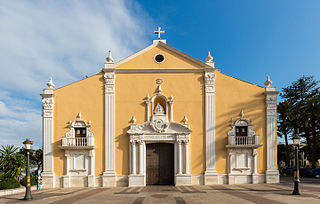
Santarém is a city and municipality located in the district of Santarém in Portugal. The population in 2011 was 61,752, in an area of 552.54 km². The population of the city proper was 29,929 in 2012.

Camarate is a former civil parish in the municipality of Loures, Lisbon District, Portugal. In 2013, the parish merged into the new parish Camarate, Unhos e Apelação. With a population of 23,000 inhabitants in 2001, the parish of Camarate extends into an area of 5.52 km².

Infante Luís of Portugal, Duke of Beja was the second son of King Manuel I of Portugal and his second wife Maria of Aragon. He participated in the Conquest of Tunis.

The Church of Santa Maria do Olival is a Roman Catholic church in the city of Tomar, in Portugal. The Church has been characterized as National Monument since 1910.

The Synagogue of Santa María la Blanca is a museum and former synagogue in Toledo, Spain. Erected in 1180, according to an inscription on a beam, it is disputably considered the oldest synagogue building in Europe still standing. It is now owned and preserved by the Catholic Church.

The Mosque of Cristo de la Luz is a former mosque in Toledo, Spain. It is the one of the ten that existed in the city during the Moorish period. The edifice was then known as Mezquita Bab-al-Mardum, deriving its name from the city gate Bab al-Mardum. It is located near the Puerta del Sol, in an area of the city once called Medina where wealthy Muslims used to live.

Olivais is a freguesia and district of Lisbon, the capital of Portugal. Located in eastern Lisbon, Olivais is west of Parque das Nações, north of Marvila and Alvalade, and east of Lumiar and Santa Clara. The population in 2011 was 33,788.

The Iglesia de El Salvador is a church in Toledo, Spain completed in 1159.

The Cathedral of St Mary of the Assumption is a Roman Catholic church located in the Spanish city of Ceuta, in a small exclave on the northwest coast of Africa.

The Castle of Castelo Vide is a medieval castle in the civil parish of Santa Maria da Devassa, municipality of Castelo de Vide, Portuguese district of Portalegre.

Igreja de Santa Maria do Castelo is a church in Tavira, Portugal. It is classified as a National Monument.

Igreja de Santa Maria is a 14th century church in Serpa, Alentejo, Portugal. It is classified as a National Monument.

The Church of Santa María de África is a Roman Catholic church in the Spanish city of Ceuta which is located in a small Spanish exclave on the north coast of Africa.

Areeiro is a station on the Green Line of the Lisbon Metro serving the Areeiro neighbourhood. The station is located in the Praça Francisco Sá Carneiro, just south of the Roma-Areeiro railway station.

The Cathedral of Saint Mary of Tudela is a Roman Catholic cathedral located in Plaza Vieja in the center of Tudela, autonomous community of Navarre, Spain. The medieval building was originally a collegiate church. It became a cathedral with the creation of the Diocese of Tudela, which existed 1783-1851 and again 1889-1956. It is now a co-cathedral in the Archdiocese of Pamplona and Tudela.
The Castle of Mós is a medieval castle located in the civil parish of Mós, municipality of Torre de Moncorvo, in the Portuguese district of Bragança.

The Iglesia de las Santas Justa y Rufina is a medieval church in Toledo, Castile-La Mancha, Spain. It is one of a group of so-called Mozarabic parish churches in Toledo, whose existence has been documented since 1156. However, certain material remains reveal the existence in this place of an Islamic construction, which would undoubtedly have to be identified with a mosque. Until very recently, the only testimony of the existence of an Islamic construction consisted of a fragment of arch that, on a Visigothic pilaster, was embedded in the northwest facade of the temple. The reuse of a piece from previous period, combined with the characteristics of the cutting of the arch, allow them to think of an Islamic work dating around 10th century.

The Casa de Santa Maria was once a luxurious private residence in Cascais, Lisbon District, Portugal. It was acquired by the Cascais Municipality in October 2004 and is now a museum. It blends several different architectural styles and influences.


















